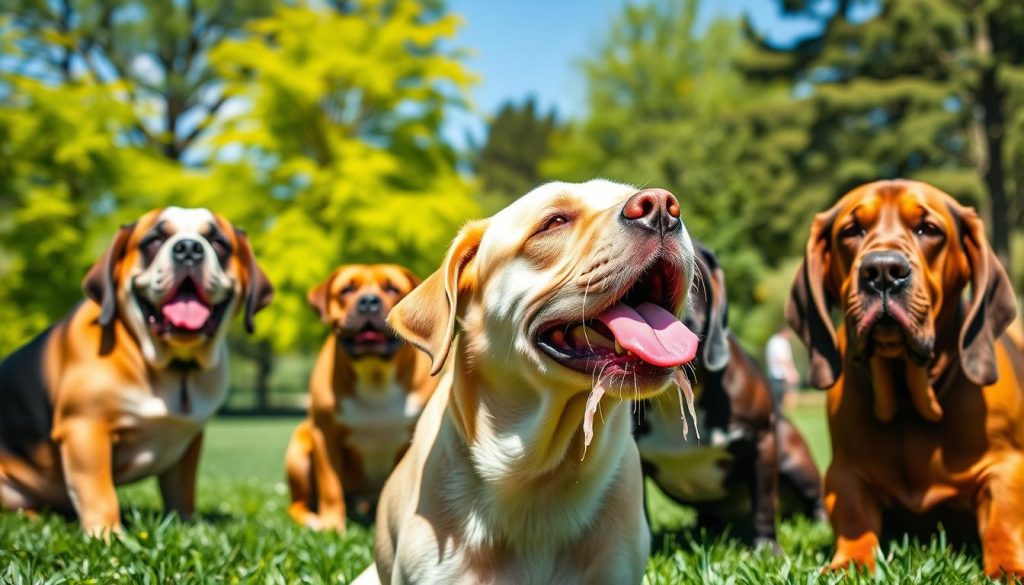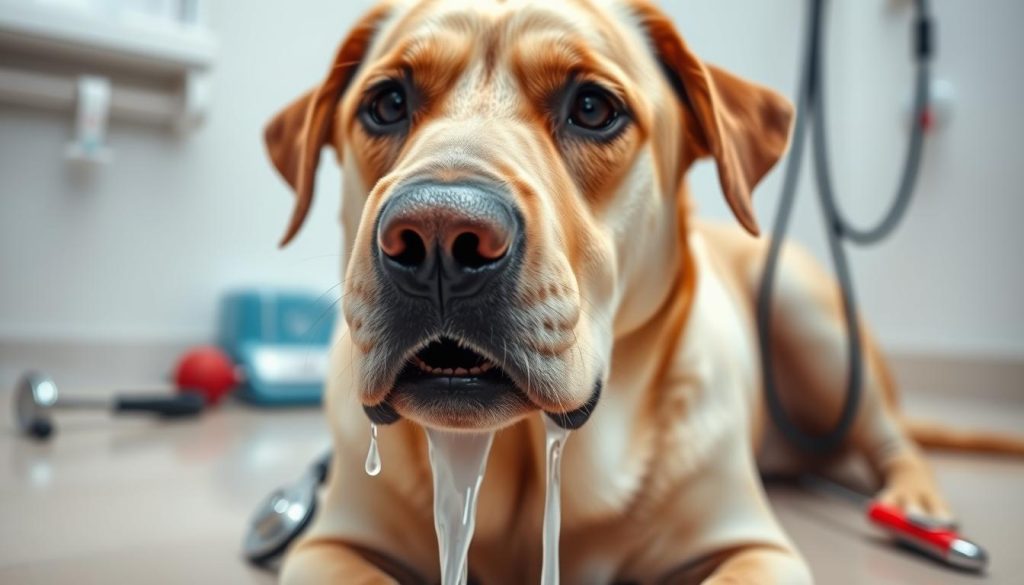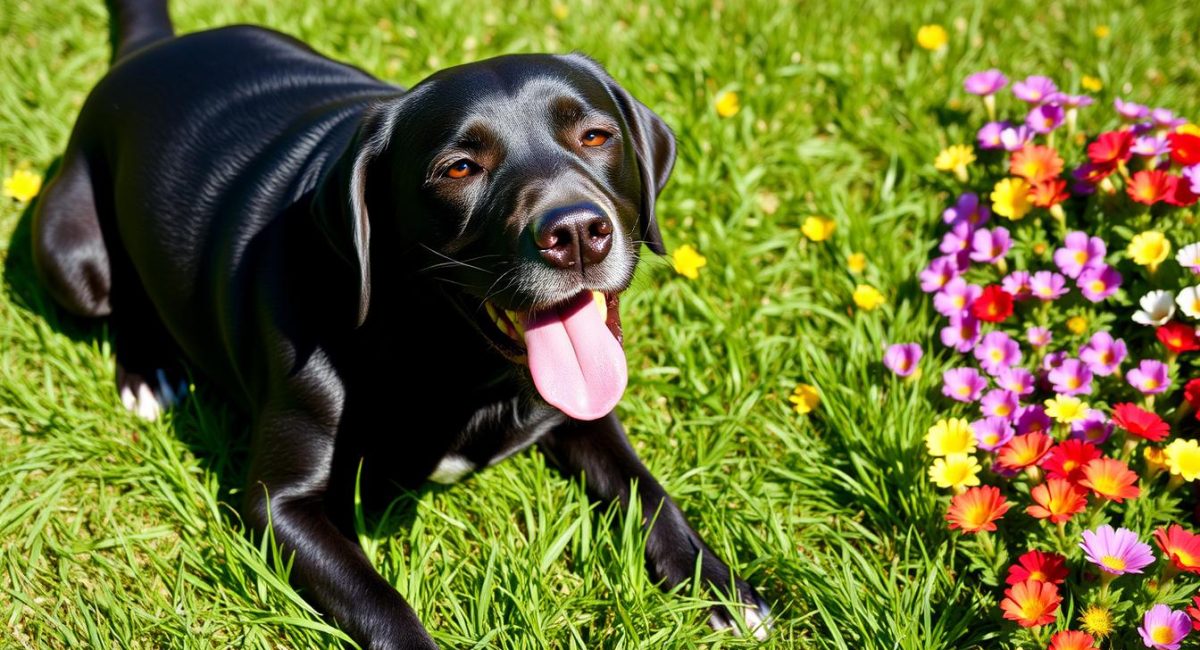Labrador Retriever Drooling: What to Expect
A recent study found that Labrador Retrievers don’t usually drool a lot. They are an exception to the rule1. All dogs make saliva to help break down their food. The average dog makes sticky saliva before eating1.
Drool is mostly water, with enzymes, proteins, minerals, and antibacterial compounds1.
Key Takeaways
- Labrador Retrievers are not typically known for excessive drooling.
- Dog drool is mostly water and contains beneficial enzymes, proteins, and minerals.
- All dogs produce saliva to help break down food, but some breeds are more prone to visible drooling.
- Factors like food anticipation, anxiety, and dental issues can trigger increased drooling in dogs.
- Consult a veterinarian if your Labrador’s drooling becomes excessive or concerning.
Introduction: Do Labrador Retrievers drool a lot?
Labrador Retrievers are loved for their friendly nature and being great family pets2. They are known for many good traits, but one question is if they drool a lot. The answer depends on the breed’s physical traits and what makes them drool more.
Overview of Labrador Retrievers and Their Tendency to Drool
Labradors have a medium to short coat and a strong, muscular body3. They belong to the Sporting Breed Group and are smart, easy to train, and love water2. Their face shape is tight, which means they usually don’t drool a lot.
Factors That Influence Drooling in Labradors
Labrador Retrievers don’t usually drool a lot, but some factors can make them drool more3. Things like looking forward to food, being excited, or feeling stressed can make them drool4. Some Labradors might drool a bit more because of their facial structure3.
Even though Labradors might drool a bit, they are not known for heavy drooling3. If their drooling is not too much and they seem fine, it’s usually okay. Just make sure to take good care of them and train them well.
Causes of Drooling in Labradors
Labradors are known for their tendency to drool. Knowing why they drool can help owners manage this trait. The shape of their mouth is a big reason they drool more than other breeds5. Dental problems and foreign objects in their mouth also cause them to drool a lot6.
Anticipation of Food and Excitement
Labradors drool a lot when they’re excited about food. Their salivary glands work hard to help digest food. This can make them drool a lot, especially when they’re getting their favourite food5.
Anxiety and Stress
Stress and anxiety make Labradors drool too. When they’re nervous or excited, their body makes more saliva. This is seen in Labradors during stressful times, like when they’re left alone or going for a car ride56.
While some drooling is normal, too much might mean there’s a health problem. This could be dental issues, something stuck in their mouth, or even a neurological condition67. If your Labrador is drooling a lot and seems off, it’s best to see a vet.
| Cause | Description |
|---|---|
| Anticipation of Food | Labradors may drool more when they anticipate their meals, as their salivary glands produce extra saliva to aid in the digestive process. |
| Anxiety and Stress | Heightened emotional states, such as nervousness or excitement, can trigger increased saliva production and drooling in Labradors. |
| Dental and Oral Issues | Dental problems, foreign objects in the mouth, and other oral health concerns can cause excessive drooling in Labradors. |
| Neurological Conditions | Certain neurological disorders, such as trigeminal neuritis and facial nerve paralysis, can result in excessive drooling in Labradors. |
| Toxic Exposure | Exposure to toxins, including insecticides, can lead to excessive drooling in Labradors and requires immediate veterinary attention. |
Understanding why Labradors drool helps owners take better care of them567.
Excessive Drooling: When to Worry
Labrador Retrievers can drool a bit, but too much or sudden drooling is a worry sign8. Some health problems can make dogs drool more than usual9. It’s key to find out why to keep your dog healthy9.
Medical Conditions that Cause Excessive Drooling
Dental issues like gingivitis or a broken tooth can make dogs drool more9. Stomach problems, like nausea or toxic poisoning, can also cause extra drooling9. Neurological issues, like seizures, can also lead to drooling9.
Signs of Underlying Health Issues
Too much drooling can mean many health problems, from motion sickness to liver disease9. Dogs might drool more if they have something stuck in their mouth or an allergic reaction9. Watching your dog’s drooling and any other symptoms is important10.
If your Labrador’s drooling changes suddenly, see your vet8. They can check your dog and find the cause10. This way, you can help your dog feel better and healthy again.
Drooling and Dental Health
Labrador Retrievers often drool due to dental health problems11. Only a small percentage of dogs have salivary gland disease11. Tumours make up about 30% of these cases11. Dental issues like tartar can cause drooling12.
Keeping your Labrador’s teeth clean is key13. Dental treats and chews help remove plaque13. Early treatment of dental problems is vital13.
Brush your Labrador’s teeth regularly11. Also, take them for yearly vet check-ups11. Senior dogs need check-ups twice a year11.
Check your Labrador’s mouth often11. Look for plaque or inflamed gums11. If you find something odd, see the vet right away11.
Good dental care can reduce drooling in Labradors13. Untreated dental disease can shorten a dog’s life by 1-3 years13. So, caring for their teeth is very important.
Drooling in Labradors often means dental problems12. Untreated dental disease can harm vital organs13. A good dental care routine can help your Labrador stay healthy and drool less.
Managing Labrador Drool
Labrador Retrievers are known for their drooling, which can be messy. But, with the right methods, you can keep your home and dog clean. Keeping a washcloth handy makes it easy to wipe your dog’s muzzle before drool hits the floor or furniture.10 It’s also key to mop your dog’s face after they eat or drink. A handkerchief or bandana around your dog’s neck can soak up the drool10.
Grooming for Drooling Dogs
Labradors, being drool-prone, need regular grooming to manage their drool10. Trimming the fur around their mouth and jowls, and brushing their coat often can cut down on drool10. Cleaning your dog’s face with a damp cloth or grooming wipe after meals also keeps them looking and feeling great.
- Trim fur around the mouth and jowls to reduce drool buildup
- Regularly brush your Labrador’s coat to manage excess drool
- Wipe your dog’s face with a damp cloth or grooming wipe after eating
“Dealing with drool is an unavoidable part of owning a Labrador Retriever, but with some strategic grooming and cleaning habits, you can keep it under control.”
Breed Comparisons: Drooling Tendencies
Dog breeds vary in how much they drool. Wolves and wild canines usually don’t drool a lot. But some domesticated breeds are known for being very slobbery14.
Bloodhounds, Mastiffs, and Saint Bernards are often slobbery. Their faces have skin folds that trap saliva. This leads to a lot of drooling14.
Labradors usually don’t drool a lot. But some may have looser faces than others14.
On the other hand, Saint Bernards drool a lot. Males are 28 to 30 inches tall and weigh 140 to 180 pounds. Females are 26 to 28 inches tall and weigh 120 to 140 pounds15.
Dogue de Bordeaux, Bloodhounds, and others also drool a lot. Their drooling is often because of their faces and size15.

Some drooling is normal in dogs. But too much could mean a health issue. If your Labrador drools a lot, see a vet. This is to keep them healthy14.
Training and Behaviour Modifications
Dealing with anxiety-induced drooling in Labradors needs a mix of training and behaviour changes. Habituation, or getting used to something, can help a lot16. Start by slowly introducing your Labrador to things that make them anxious, like car rides or vet visits. This can help them get used to it and drool less16.
Conditioning, linking things to actions, is also useful for managing drooling16. Reward your Labrador with treats or praise when they stay calm. This teaches them to be calm in situations that used to make them drool a lot16.
- Use positive reinforcement training to encourage good behaviour without drooling.
- Think about calming supplements or pheromone diffusers to ease your Labrador’s anxiety.
- Make their environment calm by adding familiar items and reducing stress.
Finding and fixing what makes your Labrador anxious is key. By tackling these issues through training and behaviour changes, you can cut down on drooling. This makes your dog happier and more relaxed16.
“Overlearning enhances retention, resistance to extinction, and automatic responses to behaviour training.”16
Every dog is different, so what works for one might not work for another. It’s crucial to work with a skilled animal behaviourist or positive-reinforcement trainer. They can create a plan that fits your Labrador’s needs and reduces drooling1698.
Seeking Veterinary Assistance
If you see changes in your dog’s drooling, it’s important to act fast and see your vet10. They will check your dog’s mouth to find out why they’re drooling more9. Often, it’s because of dental issues like tartar or growths109.
If the vet can’t find anything in the mouth, they might do more tests. This could include blood work, X-rays, or biopsies10.
Drooling can also mean there’s a bigger health problem. This could be something like a stomach issue, liver or kidney problem, or even a brain disorder95. Your vet will try to figure out what’s wrong and tell you the best way to fix it5.
This might mean dental work, removing growths, fixing stomach problems, or even changing how you handle your dog to reduce stress5.
Some dogs, like Mastiffs, Bulldogs, and Bloodhounds, drool more than others5. But if your dog’s drooling changes suddenly or a lot, you should see your vet right away1095.

By teaming up with your vet, you can solve your dog’s drooling problem. This will help keep them healthy and happy1095.
Conclusion
Labrador retriever drooling is common, even if not as much as in some other breeds. Owners need to manage it to keep their homes clean and comfortable. Dog drool management is key for everyone’s happiness.
The amount of drooling in Labradors can vary a lot. It’s influenced by things like food excitement, anxiety, and health issues. Excessive drooling or sudden changes need vet checks, as they might show a bigger problem.17 Knowing why Labradors drool and when it’s too much helps owners manage it. This keeps their dogs healthy and happy.
Regular dental care, grooming, and stress training can reduce drooling in Labradors. Also, knowing about drooling in different breeds helps owners prepare for any challenges.1819 With the right steps, Labrador owners can enjoy their dogs’ company without too much drool.
FAQ
Do Labrador Retrievers drool a lot?
Labrador Retrievers don’t drool as much as some other breeds. But, all dogs drool a bit. Some Labradors might drool more because of their facial structure.
What causes drooling in Labradors?
Labradors drool for a few reasons. They might drool when they’re excited for food, stressed, or anxious. They can also drool due to dental problems, infections, or other health issues.
When should I be concerned about my Labrador’s drooling?
If your Labrador drools more than usual, it’s time to see the vet. Excessive drooling can mean there’s a health problem that needs attention.
How can I manage my Labrador’s drooling?
To manage Labrador drool, groom them regularly. Keep a cloth or bandana to wipe their face. Also, make sure their teeth are clean. Fixing the cause of drooling, like anxiety or dental issues, can help too.
How do Labradors compare to other breeds when it comes to drooling?
Labradors drool less than breeds like Bloodhounds, Mastiffs, and St. Bernards. But, some Labradors might drool more because of their face shape.
Source Links
- Dog Drooling: Why Do Dogs Drool And What To Do About It – https://www.thelabradorsite.com/why-does-my-dog-drool/
- Labrador Retriever Dog Breed Information & Characteristics – https://dogtime.com/dog-breeds/labrador-retriever
- Labrador Retriever (Lab) – https://www.dailypaws.com/dogs-puppies/dog-breeds/labrador-retriever
- Meet the Breeds: The Labrador Retriever – https://petstek.com/blogs/petstek-blog/labrador-retriever?srsltid=AfmBOorXTr-FHU_rupdfWTN0QxH5Y_Kar8Xda9XXcOhSP9Q06A_dn2X3
- Drooling in dogs – https://www.pdsa.org.uk/pet-help-and-advice/pet-health-hub/symptoms/drooling-in-dogs
- Why Is My Dog Drooling? 8 Common Reasons | BetterVet – https://bettervet.com/resources/pet-symptoms/why-is-my-dog-drooling
- Top 7 Reasons For Excessive Drooling In Dogs: Hypersalivation In Dogs | Kingsdale Animal Hospital – https://www.kingsdale.com/top-7-reasons-for-excessive-drooling-in-dogs-hypersalivation-in-dogs
- Do Golden Retrievers Drool? Normal & Excessive Drooling – My Golden Retriever Puppies – https://www.mygoldenretrieverpuppies.com/blog/do-golden-retrievers-drool
- Why is my dog drooling? – Vet Help Direct – https://vethelpdirect.com/vetblog/2020/01/10/why-is-my-dog-drooling/
- Dealing with Drooling | VCA Animal Hospitals – https://vcahospitals.com/know-your-pet/dealing-with-drooling
- What Does Excessive Drooling in Dogs Mean – https://www.wellpets.com/blog/167-what-does-excessive-drooling-in-dogs-mean/
- Pet Vet Battlewood – https://www.petvet.vet/site/blog/2023/08/15/drooling-dogs
- Labradors At 2 Years Old – Understanding Dental Disease – Itch Pet | Itch Pet – https://www.itchpet.com/blog/post/labradors-at-2-years-old-understanding-dental-disease
- Do Labrador Retrievers Drool A Lot More Than Other Dogs? – https://www.thelabradorsite.com/do-labrador-retrievers-drool-a-lot/
- 10 Dog Breeds That Drool the Most – https://www.thesprucepets.com/dog-breeds-that-drool-4776096
- Behavior Modification in Dogs – Behavior Modification in Dogs – Merck Veterinary Manual – https://www.merckvetmanual.com/dog-owners/behavior-of-dogs/behavior-modification-in-dogs
- My Dog Is Drooling a Lot: When to Be Concerned (Vet Answer) – Dogster – https://www.dogster.com/ask-the-vet/dog-drooling-a-lot
- My Dog Is Drooling and Acting Strange: Vet Approved Advice on What to Do – Dogster – https://www.dogster.com/dog-health-care/dog-is-drooling-and-acting-strange
- Dog Saliva: 9 Facts You Should Know – https://www.petmd.com/dog/general-health/dog-saliva-9-fast-facts-you-should-know

